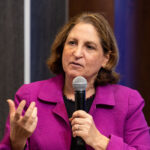LEXINGTON, Neb. — Naidid Aguilera was feeling stuck.
Stuck at her job at a Tyson meatpacking plant. Stuck in a central Nebraska town after emigrating from Mexico roughly 15 years earlier with her husband. Instead of working in her dream role as an elementary school teacher, she spent her days hauling cow organs for inspection.
Then she learned about one group’s effort to expand access to high-quality child care here, specifically for families who speak little English, through free training and help navigating state licensing laws. The classes would be entirely in Spanish, eliminating one of the single-biggest hurdles for expanding care in this town of 11,000, where 2 out of 3 residents are Hispanic. For years, it had just one Spanish-speaking child care provider.
As Aguilera dialed the phone to sign up for classes, she recalled feeling overcome with emotion because she had believed her goal of working with children was left back in Mexico.
“The only question they really asked me was why I would want to pursue a child care license,” Aguilera said through a Spanish interpreter. “My response was, ‘I want to do more than where I’m at right now at Tyson and move further in life. I’m looking for another opportunity.’”
Through the local advocacy of several organizations, the community will have nine Spanish-speaking providers by this summer — including Aguilera. Although Lexington still has a waiting list of 550 children in need of care, the town’s child care gap has been cut by nearly 100 children with the addition of new providers, according to local data.
A nonprofit group called Communities for Kids, partnering with other organizations, began training providers after community surveys revealed the town’s need for Spanish-language child care. The group, founded in 2017, helps develop quality early care and education programs in Nebraska communities that don’t have enough of them.
“If you can’t communicate, or your culture is different, trusting a white English-speaking woman with your child — that’s a lot of trust,” said Shonna Werth, Communities for Kids’ assistant vice president of early childhood programs.
Shonna Werth, left, talks to Miriam Guedes’ husband, Alberto, along with Maricela Novoa, right, and Stephanie Novoa, far right, at Blooming Daycare. Credit: Lauren Wagner for The Hechinger Report
At the time, with only one bilingual provider, most Hispanic families were shuffling their children among neighbors or family members for care. It was the only way for Spanish-speaking parents to communicate with a provider directly.
Some parents employed by the local meatpacking plants worked split shifts to ensure their children were with someone they could communicate with.
“You wonder, ‘Where are those kids? What experiences are they having?’” Werth said.
Related: Our biweekly Early Childhood newsletter highlights innovative solutions to the obstacles facing the youngest students. Subscribe for free.
There’s a lack of Spanish-speaking or bilingual early childhood education providers across the nation, said Tania Villarroel, early childhood senior policy analyst for UnidosUS, a Hispanic civil rights and advocacy organization. One of the barriers to growing the child care workforce is the process of getting certified.
“It’s a resource to speak Spanish, but if you don’t have good English skills, it can also be really hard to get those degrees,” Villarroel said. “It benefits Latino children to have a Latino provider because they have the same lived experience, same heritage — it’s easier for them to connect to families, to get more family engagement.”
Recent research from the National Research Center on Hispanic Children & Families found that Latino families across the United States consider multiple factors when trying to find child care, like schedule flexibility and whether the provider offers culturally responsive care for their children.
“Some [places] serve only Hispanic children, and they have Hispanic providers. But then other sites have no Hispanic children, and probably no Hispanic representation. So we see this sort of segregation going on,” said Julia Mendez, a researcher for the center. “There’s the families who are seeking the care and the families can’t find what they need, because it’s not available.”
Mendez said it’s common for home-based care to be of lower quality for Hispanic families, becauseif their providers don’t speak English, they have fewer opportunities for professional development or credentialing.
Boosting the quality of Lexington’s child care — not just its accessibility — was crucial, Werth said. She joined two local child care advocates, sisters Stephanie and Maricela Novoa, to implement the free training. Maricela Novoa is an early learning bilingual specialist providing assistance to early childhood educators through the Nebraska Department of Education. Stephanie Novoa, a realtor, also works with Communities for Kids and volunteers as a special advocate with the courts.
Maricela Novoa, left, stands with Shonna Werth, center, and Stephanie Novoa, right, outside Naidid Aguilera’s child care center. The three women have been key in increasing child care access for Spanish-speaking families in Lexington, Neb. Credit: Lauren Wagner for The Hechinger Report
The training in Lexington began in 2021 with a program called the “Professional Learning Series,” which included 55 hours of classes on the licensing process or required skills for high-quality early childhood education. The series was taught exclusively in English – and did not attract Spanish-speakers.
Another series followed in 2022, and this time, there was a professional interpreter and headsets available for translation. The class was held every Tuesday night from August through November at the local YMCA, with free child care and food available.
“We were kind of building that foundation of [making] sure there are things that if they want to get licensed, this will be useful for them if and when they ever get there,” Werth said. “Like, let’s not just do training for the sake of training, but training that has a dual purpose. They’re building their education and their skills so that they can have better interactions with the kids they are caring for or as parents, because not all of them are on that trajectory of being a child care provider.”
Related: Our child care system gives many moms a draconian choice: Quality child care or a career
Werth said when the classes first opened, the goal was to reach five or six participants. Twenty showed up.
“Midway through the classes, participants would bring a neighbor or a friend. And so we had to close the class because it was a small room,” said Maricela Novoa. “It was just that word of mouth, that trust piece — this is safe, this is good. This is something that you’ll value.”
Next was a 10-week business class in 2023, followed by courses on parenting and safety that were provided in English with a Spanish interpreter.
Aguilera said she remembers many long days last spring working at the meatpacking plant, then attending classes in the evening.
“The classes were one after another, but at the same time that was nice because it was just all over at once,” Aguilera said. “I was tired, but it was very worth it.”
Werth said it was slow-going to license the nine women, especially when they ran into language barriers.
“Stephanie and I met with six or eight participants one night. They all brought their licensing packets, and we sat down with them to help them just try to work through that. And [it] took hours to do, which should not be the case,” Werth said.
It took several hours more to help participants navigate an online class. Most of them had little experience working with technology other than their phones. Werth recalled the library closing around them one evening as they helped participants use computers for the first time.
Naidid Aguilera displays many Spanish materials in her new child care center, El Niño Del Tambor Daycare. She recently received her license to operate the center from her home in Lexington, Neb. Credit: Lauren Wagner for The Hechinger Report
Maricela Novoa said the lack of Spanish materials or Spanish-speaking representatives is a constant hurdle for future providers. Even now, a Lexington resident could call a state agency for help but not get anyone on the phone who can speak Spanish.
“It does get tiring, because you’re the only person in the room saying, ‘Hey, is this available in Spanish?’ when there’s a new resource available,” Maricela Novoa said.
Mendez, of the National Research Center on Hispanic Children & Families, said her organization calls these obstacles “administrative burden.”
“It’s true across the board that any barrier, like a language barrier, can keep people out,” Mendez said. “With administrative burden, you have to learn what the resources are, but first, you have to know about them. And then you have to navigate the systems to try to figure out how to get the credential or the support that you’re looking for.”
Related: In-home child care could be solution for rural working parents
Just a few years ago, Miriam Guedes was the only Spanish-speaking child care provider in Lexington. She started a daycare on her own after being a paraprofessional at the public school district’s preschool for 19 years.
She obtained her license by herself — an uphill battle, she said, with all the paperwork in English — but soon wanted to do more, although she didn’t know how.
Guedes, whose business is attached to her house, said people started knocking on her door asking if she had room for more kids, but she could take only eight at a time.
“People were coming in, asking for more and more and more,” she said.
She learned about the free training being offered through Communities for Kids and signed up. The training gave her business experience and the skills to expand her certification, allowing her to care for 12 children at once at her center, “Blooming Daycare.” Now she’s a mentor to Aguilera and the other women who are getting licenses.
Children at Miriam Guedes’ child care center, Blooming Daycare, provided family photos and copied them into drawings for her picture wall. Credit: Lauren Wagner for The Hechinger Report
Aguilera opened her own child care business, “El Niño Del Tambor Daycare” early this spring. The name means “little drummer boy.” It’s in her basement, recently renovated to include cribs, small chairs and a table, organizers filled with colorful books and crafts, an alphabet rug and more. Her new license is taped to a marker board at the entrance.
She enrolled her first child mid-March and now has four children in her care, in addition to two of her own children. Aguilera said she could easily see herself hiring an assistant and taking on more children in the near future.
It’s something that changed her life for the better, she said.
“When I first started taking in kids, I kind of broke down a little bit because it came full circle,” Aguilera said. “I didn’t have the opportunity to stay home with my kids. And now I get to do this. I’m so happy.”
This story about child care solutions was produced by The Hechinger Report, a nonprofit, independent news organization focused on inequality and innovation in education. Sign up for the Hechinger newsletter.
The post A small rural town needed more Spanish-language child care. Here’s what it took appeared first on The Hechinger Report.
LEXINGTON, Neb. — Naidid Aguilera was feeling stuck. Stuck at her job at a Tyson meatpacking plant. Stuck in a central Nebraska town after emigrating from Mexico roughly 15 years earlier with her husband. Instead of working in her dream role as an elementary school teacher, she spent her days hauling cow organs for inspection.
The post A small rural town needed more Spanish-language child care. Here’s what it took appeared first on The Hechinger Report. Early Education, News, Child Care, English language learners, Featured The Hechinger Report









